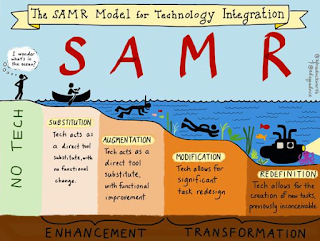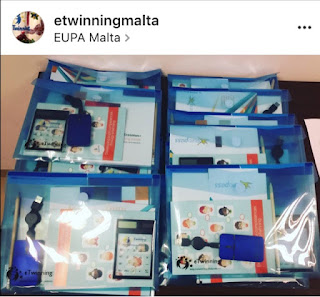What Comes First ? A Chicken and Egg situation...
A friend and mentor recently introduced me to the online document, DigComp 2.0, published by the European Commission's Joint Research Centre. The document,
"offers a tool to improve citizens’ digital competence. DigComp was first published in 2013 and has become a reference for many digital competence initiatives at both European and Member State levels"
Abstract, DigiComp 2.0,
EUR 27948 EN
I must admit it was very interesting to read the document in its entirety, especially since, as a promoter of the eTwinning Action in Malta, I have strived to instil these very skills in teachers and students working on a project. Transversal skills - Digital Competences, Entrapreneurship Competence, Critical Thinking, Problem Solving, Learning to Learn - all skills that I felt that could be reached and were a by-product of participating in an eTwinning Project. Let us analyse them one by one within the context of eTwinning....
- Digital Competences - no qualms there. eTwinning introduces the the uninitiated the concept of a virtual classroom for the teacher and students, creating a fertile ground for achieving these same concepts.
- Entrapreneurship Competences - especially in the case of secondary schools projects, have seen quite an interesting array of projects from the VET sector, ALP as well as 'regular' secondary schools where students were encouraged to look at the impact their actions were having on a national and European sphere.
- Critical Thinking - eTwinning is not (contrary to some beliefs) just "sharing of information". The process itself encourages students to look up information themselves, to learn how to share their results safely, to discuss, and most importantly, to evaluate.
- Problem Solving - Again, quite an interesting array of projects in the last seven years, focused on particular 'problems' (small and large) for which students had to find an answer. And I am not referring simply to the all popular quizzes present on the TwinSpaces. Real problems such as energy conservation, environmental concerns, animal awareness, and most recently, a project which focused on transforming a disused space in a secondary school to a reading corner thanks to the involvement of various NGOs.
- Learning to Learn - The crux of eTwinning is that all involved partners (teachers and students) engage in peer-to-peer (collaborative, not parallel) activities that promote finding information themselves, working as a group, and learning with and from each other.
In conclusion....all skills that one can safely say, fostered through an eTwinning Collaboration.
Or is it ?
Does eTwinning (when done properly and with these competences in mind) lead to the acquisition of the skills above, or is it the very fostering of these skills which leads to an increase in the quality of an eTwinning Project ? In colloquial terms - what came first - the chicken, or the egg ?
In my humble opinion, there is no simple yes or no answer to this dilemma. There are of course, pros and cons for both arguments. In a "sweeping statement" kind of way, yes, eTwinning does of course foster many (if not all) Digital Competencies as mentioned above in the project partners, especially with regards to critical thinking, problem solving and learning to learn. Indeed, these are the projects that tend to 'shine' above the rest, a far cry from the mere uploading of final results on a TwinSpace, with no real plan, process or evaluation. On the other hand, the more a partner comes 'armed' with such concepts already in place (or at least starting to form) the more an eTwinning Project becomes rich, diverse and fruitful, with an automatic increase in the quality of the final product (which is what I am mostly concerned about with all truthfulness).
I will leave you to decide...and would be honoured if readers would be so kind as to offer suggestions on the Tricider below:
Thank you for your comments, looking forward to hear your thoughts on the matter !
















